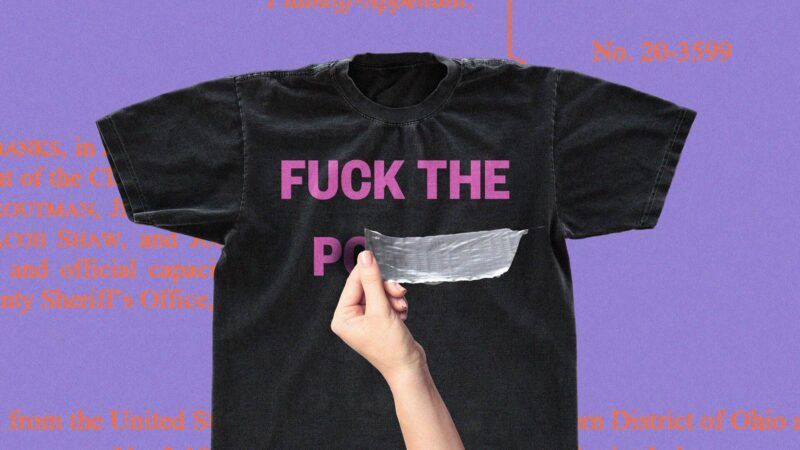Appeals Court Rules Ohio Cops Didn't Have Cause To Arrest Man Wearing 'Fuck the Police' Shirt
The sheriff's deputies are also not entitled to qualified immunity because the First Amendment right to offend police has been repeatedly upheld.

Sheriff's deputies in Ohio didn't have probable cause to arrest a man for hurling vulgarities at them and wearing a t-shirt that said "fuck the police," the U.S. Court of Appeals for the Sixth Circuit ruled Tuesday.
The Sixth Circuit found Michael Wood had a First Amendment right to cuss out a gaggle of deputies who removed him from a county fair in 2016 after someone called 911 to complain about his shirt. The deputies also are not entitled to qualified immunity from Wood's suit, the Sixth Circuit ruled, because Wood's right to be free from arrest was clearly established by a long line of court opinions protecting obscene language directed at authorities.
"The Sixth Circuit got this one right, and we're very pleased with the result," says David Carey, deputy legal director of the American Civil Liberties Union of Ohio, which filed an amicus brief on behalf of Wood. "The ruling removes any doubt that criticism of police and their actions—even coarse and profane criticism—falls under the core protections of the First Amendment, and cannot be a lawful basis for an arrest on its own."
According to court documents, Wood wore the shirt to the Clark County Fair on a July day in 2016 because of past unpleasant interactions with the Clark County Sheriff's Office, which he believed was "a cesspool." (His opinion has likely not changed.)
After a fair patron complained, several Clark County Sheriff's deputies and the fair's executive director confronted Wood and ordered him to leave. Wood agreed to go, and as he headed toward the exit he berated the director and officers.
"One, two, three, four, five, six motherfuckers. Six bitch-ass fucking pigs," Wood said, counting the number of deputies escorting him to the fair exit. "Fucking thugs with guns that don't uphold the United States Constitution. Fuck all you. You dirty rat bastards."
Wood demanded to leave through the back gate of the fair, despite the deputies' insistence that they would only escort him to the front gate. ("Then that's your fucking fat-ass problems, motherfucker, I'm leaving.") As Wood continued walking toward the exit and arguing with the fair director, the deputies debated among themselves if they could arrest him and what for.
They eventually arrested Wood and charged him with disorderly conduct and obstruction. Prosecutors later dismissed both charges. Wood filed a civil rights lawsuit against all six sheriff's deputies, alleging false arrest and violations of his First Amendment rights.
The deputies argued that Wood's arrest was lawful under the "fighting words" doctrine established by the Supreme Court's 1942 ruling in Chaplinsky v. New Hampshire. That doctrine still lives on, but its application has been significantly limited over the decades.
A U.S. District Court granted summary judgment in favor of the Clark County sheriff's deputies, ruling that Woods' speech was not protected under Ohio state courts' broader reading of Chaplinsky.
The Sixth Circuit, however, reversed that order, finding Ohio's interpretation of the fighting words doctrine incongruent with federal precedent and noting that, while Wood's speech was profane, it did not create a recipe for immediate violence.
Carey says that upholding the lower court ruling would have had "very disturbing implications—essentially creating a 'race to the bottom' situation, where police could disregard First Amendment protections that have been clearly established in federal court, as long as they could find a state court case that had been less protective of free speech."
There's a wide body of federal case law upholding the First Amendment right to flip off or otherwise offend police officers. In 1987, the Supreme Court struck down a Houston ordinance prohibiting verbal abuse of police officers, declaring that "the freedom of individuals verbally to oppose or challenge police action without thereby risking arrest is one of the principal characteristics by which we distinguish a free nation from a police state."
The Sixth Circuit opinion in Wood's case notes that it previously ruled in 2002 that a Grand Rapids man had a constitutionally protected right to call an officer an "asshole," and ruled in 2016 that saying "fuck the police" didn't rise to the level of "fighting words."
Despite clear guidance from courts, police around the country still mete out illegal arrests and tickets to people who hurt their feelings. For example, last year a 19-year-old Utah woman was charged with a hate crime for allegedly stomping on a "Back the Blue" sign in front of a police officer.
Also last year, Tennessee police arrested and charged a man, who has since filed a First Amendment lawsuit, with harassment for posting a doctored photo online of two men urinating on a dead police officer's grave. A judge dismissed the harassment charge.
An Iowa man won a lawsuit in 2019 after he was charged with third-degree harassment for posting online that a sheriff's deputy was a "stupid sum bitch" and "butthurt."
A Tennessee resident was arrested in 2017 after he wrote "Erin's police chief is a bitch" in white paint on the back of his car.
Wood's case now heads back to a U.S. District Court for further proceedings.
